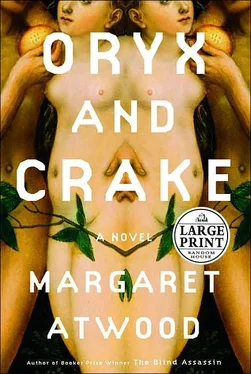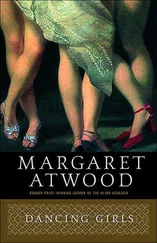“Here,” said Uncle En. He pulled Oryx out of the car. “What’s my name?” he said to her, putting his smiling face down close.
“Uncle En,” she said. The two soldiers laughed and Uncle En laughed also. He patted Oryx on the shoulder and told her to get back into the car, and shook hands with the soldiers, putting his hand into his pocket first, and then the soldiers swung the gate open. Once the car was going along the road again Uncle En gave Oryx a hard candy, in the shape of a tiny lemon. She sucked it for a while and then took it out to keep. She had no pocket so she held it in her sticky fingers. That night she comforted herself by licking her own hand.
The children cried at night, not loudly. They cried to themselves. They were frightened: they didn’t know where they were going, and they had been taken away from what they knew. Also, said Oryx, they had no more love, supposing they’d had some in the first place. But they had a money value: they represented a cash profit to others. They must have sensed that—sensed they were worth something.
Of course (said Oryx), having a money value was no substitute for love. Every child should have love, every person should have it. She herself would rather have had her mother’s love—the love she still continued to believe in, the love that had followed her through the jungle in the form of a bird so she would not be too frightened or lonely—but love was undependable, it came and then it went, so it was good to have a money value, because then at least those who wanted to make a profit from you would make sure you were fed enough and not damaged too much. Also there were many who had neither love nor a money value, and having one of these things was better than having nothing.
The city was a chaos, filled with people and cars and noise and bad smells and a language that was hard to understand. The four new children were shocked by it at first, as if they’d been plunged into a cauldron of hot water—as if the city was physically hurtful to them. Uncle En had experience, however: he treated the new children as if they were cats, he gave them time to get used to things. He put them into a small room in a three-storey building, on the third floor, with a barred window they could look out but not climb out, and then he led them outside gradually, a short distance at first and an hour at a time. There were already five children staying in the room, so it was crowded; but there was enough space for a thin mattress for each child, laid down at night so the entire floor was covered with mattresses and children, then rolled up during the day. These mattresses were worn and stained, and smelled of urine; but rolling them up neatly was the first thing the new children had to learn.
From the other, more seasoned children they learned more things. The first was that Uncle En would always be watching them, even when it appeared they had been left in the city on their own. He would always know where they were: all he had to do was hold his shiny watch up to his ear and it would tell him, because there was a little voice inside it that knew everything. This was reassuring, as nobody else would be allowed to harm them. On the other hand, Uncle En would see if you didn’t work hard enough or tried to run away, or if you kept for yourself any of the money you got from the tourists. Then you would be punished. Uncle En’s men would beat you and then you would have bruises. They might burn you as well. Some of the children claimed to have endured these punishments, and were proud of it: they had scars. If you tried these forbidden things often enough—laziness, theft, running away—you would be sold, to someone much worse—it was said—than Uncle En. Or else you would be killed and tossed on a rubbish heap, and nobody would care because nobody would know who you were.
Oryx said that Uncle En really knew his business, because children would believe other children about punishments more readily than they would believe adults. Adults threatened to do things they never did, but children told what would happen. Or what they were afraid would happen. Or what had happened already, to them or to other children they’d known.
The week after Oryx and her brother arrived in the mattress room, three of the older children were taken away. They were going to another country, said Uncle En. This country was called San Francisco. Was it because they’d been bad? No, said Uncle En, it was a reward for being good. All who were obedient and diligent might go there some day. There was nowhere Oryx wanted to go except home, but “home” was becoming hazy in her mind. She could still hear her mother’s spirit calling You will come back , but that voice was becoming fainter and more indistinct. It was no longer like a bell, it was like a whisper. It was a question now, rather than a statement; a question with no answer.
Oryx and her brother and the other two newcomers were taken to watch the more experienced children selling flowers. The flowers were roses, red and white and pink; they were collected at the flower market early in the morning. The thorns had been removed from the stems so the roses could be passed from hand to hand without pricking anyone. You had to loiter around the entranceways to the best hotels—the banks where foreign money could be changed and the expensive shops were good locations too—and you had to keep an eye out for policemen. If a policeman came near or stared hard at you, you should walk the other way quickly. Selling flowers to the tourists was not allowed unless you had an official permit, and such permits were too expensive. But there was nothing to worry about, said Uncle En: the police knew all about it, only they had to appear as if they didn’t know.
When you saw a foreigner, especially one with a foreign woman beside him, you should approach and hold up the roses, and you should smile. You should not stare or laugh at their strange foreign hair and water-coloured eyes. If they took a flower and asked how much, you should smile even more and hold out your hand. If they spoke to you, asking questions, you should look as if you didn’t understand. That part was easy enough. They would always give you more—sometimes much more—than the flower was worth.
The money had to be put into a little bag hanging inside your clothes; that was to protect against pickpockets and random snatching from street urchins, those unlucky ones without an Uncle En to look after them. If anyone—especially any man—tried to take you by the hand and lead you off somewhere, you should pull your hand away. If they held on too tight you should sit down. That would be a signal, and one of Uncle En’s men would come, or Uncle En himself. You should never get into a car or go into a hotel. If a man asked you to do that, you should tell Uncle En as soon as possible.
Oryx had been given a new name by Uncle En. All the children got new names from him. They were told to forget their old names, and soon they did. Oryx was now SuSu. She was good at selling roses. She was so small and fragile, her features so clear and pure. She was given a dress that was too big for her, and in it she looked like an angelic doll. The other children petted her, because she was the littlest one. They took turns sleeping beside her at night; she was passed from one set of arms to another.
Who could resist her? Not many of the foreigners. Her smile was perfect—not cocky or aggressive, but hesitant, shy, taking nothing for granted. It was a smile with no ill will in it: it contained no resentment, no envy, only the promise of heartfelt gratitude. “Adorable,” the foreign ladies would murmur, and the men with them would buy a rose and hand it to the lady, and that way the men would become adorable too; and Oryx would slip the coins into the bag down the front of her dress and feel safe for one more day, because she had sold her quota.
Читать дальше












